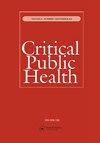The role of small, locally-owned businesses in advancing community health and health equity: a qualitative exploration in a historically Black neighborhood in the USA
IF 2.3
3区 医学
Q2 PUBLIC, ENVIRONMENTAL & OCCUPATIONAL HEALTH
引用次数: 0
Abstract
Multi-sector efforts to address the structural drivers of health inequities faced by racial and ethnic minority communities in the USA often ignore the potential of action by for-profit businesses, perhaps due to skepticism about the role of business in such efforts. However, given the need to harness diverse forms of capital to address structural harms, and recent calls to identify oft-ignored systemic pathways to health, we examined the role of business – specifically small, locally-owned businesses – in promoting community health and well-being. This study explored the role of small, locally owned businesses in community health, and local understandings of the value of such action, in the context of Roxbury, Massachusetts, a historically Black community with a substantial Latinx population. We conducted 20 semi-structured interviews between June and November 2021 with small business owners and staff, as well as leaders and staff from local non-profit organizations, anchor institutions, and one large business. Constructivist and critical perspectives guided the work. We used a team-based, thematic analysis approach; the team included residents and a small local business owner. Participants described pride in the neighborhood and emphasized small businesses’ contribution to long-term community well-being by investing social, cultural, human, and financial capital. Business owners saw their work as a way of giving back and did so in ways reflecting their deep understanding of community needs, aspirations, and identity. Public health efforts should engage pro-social small businesses embedded in marginalized communities, thereby supporting and amplifying businesses’ existing contributions to advancing equitable community health.小型本地企业在促进社区健康和健康公平中的作用:美国历史上黑人社区的定性探索
多部门努力解决美国种族和少数民族社区面临的卫生不平等的结构性驱动因素,往往忽视了营利性企业采取行动的潜力,这可能是由于对企业在此类努力中的作用持怀疑态度。然而,鉴于需要利用各种形式的资本来解决结构性危害,以及最近呼吁确定经常被忽视的系统性健康途径,我们研究了企业-特别是小型的地方企业-在促进社区健康和福祉方面的作用。本研究以马萨诸塞州罗克斯伯里为例,探讨了当地小型企业在社区卫生中的作用,以及当地人对这种行动价值的理解。罗克斯伯里是一个历史上的黑人社区,拥有大量拉丁裔人口。我们在2021年6月至11月期间对小企业主和员工,以及当地非营利组织、锚定机构和一家大型企业的领导和员工进行了20次半结构化访谈。建构主义和批判观点指导了这项工作。我们使用了基于团队的主题分析方法;该团队包括居民和当地一名小企业主。与会者描述了对社区的自豪感,并强调小企业通过投资社会、文化、人力和金融资本,为社区的长期福祉做出了贡献。企业主将他们的工作视为回馈社会的一种方式,并以反映他们对社区需求、愿望和身份的深刻理解的方式这样做。公共卫生工作应使边缘化社区的亲社会小企业参与进来,从而支持和扩大企业对促进公平社区卫生的现有贡献。
本文章由计算机程序翻译,如有差异,请以英文原文为准。
求助全文
约1分钟内获得全文
求助全文
来源期刊

Critical Public Health
Multiple-
CiteScore
5.90
自引率
7.10%
发文量
36
期刊介绍:
Critical Public Health (CPH) is a respected peer-review journal for researchers and practitioners working in public health, health promotion and related fields. It brings together international scholarship to provide critical analyses of theory and practice, reviews of literature and explorations of new ways of working. The journal publishes high quality work that is open and critical in perspective and which reports on current research and debates in the field. CPH encourages an interdisciplinary focus and features innovative analyses. It is committed to exploring and debating issues of equity and social justice; in particular, issues of sexism, racism and other forms of oppression.
 求助内容:
求助内容: 应助结果提醒方式:
应助结果提醒方式:


